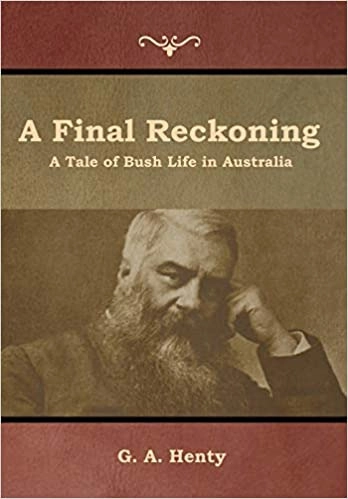Reading Time
4 hrs 38 mins
How long to read A Final Reckoning A Tale of Bush Life in Australia?
The estimated word count of A Final Reckoning A Tale of Bush Life in Australia is 69,285 words.
A person reading at the average speed of 250 words/min, will finish the book in 4 hrs 38 mins. At a slower speed of 150 words/min, they will finish it in 7 hrs 42 mins. At a faster speed of 450 words/min, they will finish it in 2 hrs 34 mins.
| A Final Reckoning A Tale of Bush Life in Australia - 69,285 words | ||
|---|---|---|
| Reading Speed | Time to Read | |
| Slow | 150 words/min | 7 hrs 42 mins |
| Average | 250 words/min | 4 hrs 38 mins |
| Fast | 450 words/min | 2 hrs 34 mins |
- Authors
-
G. A. Henty
More about A Final Reckoning A Tale of Bush Life in Australia
69,285 words
Word Count
for A Final Reckoning A Tale of Bush Life in Australia
228 pages
Pages
7 hours and 27 minutes
Audiobook length
Description
George Alfred Henty (8 December 1832 – 16 November 1902) was a prolific English novelist and war correspondent. He is best known for his historical adventure stories that were popular in the late 19th century. His works include The Dragon & The Raven (1886), For The Temple (1888), Under Drake's Flag (1883) and In Freedom's Cause (1885).G. A. Henty was born in Trumpington, near Cambridge. He was a sickly child who had to spend long periods in bed. During his frequent illnesses he became an avid reader and developed a wide range of interests which he carried into adulthood. He attended Westminster School, London, and later Gonville and Caius College, Cambridge, where he was a keen sportsman. He left the university early without completing his degree to volunteer for the Army Hospital Commissariat when the Crimean War began. He was sent to the Crimea and while there he witnessed the appalling conditions under which the British soldier had to fight. His letters home were filled with vivid descriptions of what he saw. His father was impressed by his letters and sent them to The Morning Advertiser newspaper which printed them. This initial writing success was a factor in Henty's later decision to accept the offer to become a special correspondent, the early name for journalists now better known as war correspondents.Henty once related in an interview how his storytelling skills grew out of tales told after dinner to his children. He wrote his first children's book, Out on the Pampas in 1868, naming the book's main characters after his children. The book was published by Griffith and Farran in November 1870 with a title page date of 1871. While most of the 122 books he wrote were for children, he also wrote adult novels, non-fiction such as The March to Magdala and Those Other Animals, short stories for the likes of The Boy's Own Paper and edited the Union Jack, a weekly boy's magazine.His children's novels typically revolved around a boy or young man living in troubled times. These ranged from the Punic War to more recent conflicts such as the Napoleonic Wars or the American Civil War. Henty's heroes – which occasionally included young ladies – are uniformly intelligent, courageous, honest and resourceful with plenty of 'pluck' yet are also modest. These virtues have made Henty's novels popular today among many Christians and homeschoolers.Henty usually researched his novels by ordering several books on the subject he was writing on from libraries, and consulting them before beginning writing. Some of his books were written about events (such as the Crimean War) that he witnessed himself; hence, these books are written with greater detail as Henty drew upon his first-hand experiences of people, places, and events.On 16 November 1902, Henty died aboard his yacht in Weymouth Harbour, Dorset, leaving unfinished his last novel, By Conduct and Courage, which was completed by his son Captain C.G. Henty.Henty is buried in Brompton Cemetery, London. (wikipedia.org)
